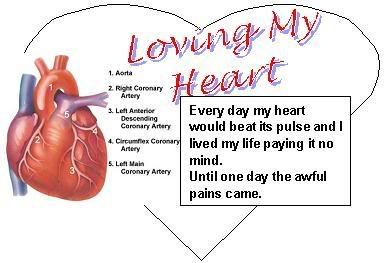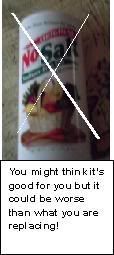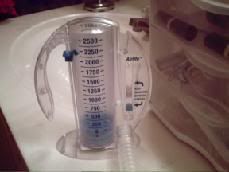
While the medicos bombard patients with all sorts of information BEFORE they go into the hospital and of course while they are IN the hospital, it was after I was sent home with wounds all over my body that I realized how very little about the turmoil and tribulations of my recovery to come.
Here, in this final chapter in the tale of an ordinary woman's life turned upside down from the sudden diagnosis of a very distressed heart (with links to the first three parts of the story) I compose my own personal list about recovering from open heart surgery, all while it is fresh in my memory and even as my wounds hurt still from just a whisper of air upon them.
First thing, find every piece of clothes with buttons down the front and start from there. Read the rest in the post.
Pic of the Day

Recovery...It's Worse Than the Operation
This will probably be my last post in the "Loving My Heart" series for a while. I've pretty much documented my experience in having a quadruple coronary heart bypass surgery, from symptom onset to diagnosis
through to the operation. This particular part of the tale is, frankly, the most helpful part of the whole thing in that I am going to document the minefield of recovering from such an operation. For when I left that hospital, besides a long discussion with Adreinne the charge nurse which was, helpful in a fashion, I had no idea what pain I would face, the perils of a normal cough, how much I should move about, how to best sleep for comfort and other recovery issues.
Beyond my personal tale, I have sure learned about America's health care system and this might surprise the hell out of yon reader, but I have formed some opinions about same.
While I was in pain during my three days in the hospital after my quadruple heart bypass surgery, it wasn't near as noticeable as the day I came home and the several weeks afterward. First, I had plenty of nursing personnel bringing me drinks as requested and pain pills were practically for free. Plus there was that happening hospital bed which went up and down with a touch, the La-Z-boy type chair by the bedside, the TV which moved anywhere, at any angle, with just a pull on the handle. Meals were delivered directly to my room, all hot and ready to eat.
The first night I came home, as happy as I was and with Darvocet allowed every four hours as required, I soon learned the horrible pain that a slim piece of material can cause as it innocently rests upon a surgical wound.
Sure, I donned a nice caftan type of attire that first day. I figured it was big, billowy, allowed me modesty but could be lifted easily for bathroom duties and could wrap close around my torso and legs should a chill descend.
The cloth resting upon my surgical wound caused the thing to get irritated beyond anything necessary. It was a pain I could have avoided had I only known.
It took me a day or so to realize that the best thing to do with that five inch chest wound was to expose it to air as often as feasible. Or course there are many caveats for such an action. Obviously it can't be too chilly or such an action would possibly cause a chest cold, something a recovering heart patient definitely does not want. It's also a lot easier to open that wound to air when one is wearing a shirt, blouse or dress that allows for the top part to be buttoned and unbuttoned as required. A zipper would work too. Also common sense would require some sort of lap cover that could easily be lifted up and over the wound should it get chilly.
In other words, forget any kind of shirt that can't be unbuttoned around and over that chest wound. The light weight of the material resting on that wound feels like a manhole cover rests upon your chest and with enough movement, the cloth will soon irritate that sensitive skin.
This was open heart surgery lesson 101 for me and once I figured this out, life became a bit happier.
Another warning to those recovering from open heart surgery that would serve patients well is that females will likely not be wearing bras for some time. Which was no problem for me as I am not big-busted but those who are uncomfortable with the notion of letting it all hang out should be prepared, mentally at least. Recovery takes time and it will take all the time it wants. There's plenty a patient can do to speed recovery along, make no mistake. But some things just ARE. Big slices in a person's chest take time to heal. The healing is uncomfortable and painful. But heal it will. I just wish someone had written down these things to expect for me. So I shall do it for a future patient recovering from this drastic surgery.

Now let's talk about hemorrhoids. If you've had one, or deal with them, then nothing will bring that nasty problem to life again like a body all discombobulated by a huge surgery and new drugs taken in the aftermath that also skew a body's former rhythm.
Indeed the last time I had issues with hemorrhoids was over ten years ago, when I was but 45 years of age. At that time I had a horrible occurrence of this particular brand of anal horror and it took three to four weeks but I learned the joy of Preparation-H and most important of all...NEVER GET CONSTIPATED!
So yon reader would grant me the wisdom of figuring out how to get around such normal aches and pains of ageing because it's just easier to change daily habits than to constantly battle flare-ups and use medication too much when our common sense should do. Thus I learned how to avoid constipation because that annoying ailment will cause a happy hemorrhoid to sit up and sing, sending its awful pain to the poor owner and being, literally, a real pain in the ass.
My own hemorrhoid sat up and sang almost the day I came home from the hospital. In fact, as was ten years ago when I learned to deal with the matter, I was busy dealing with other things and failed to notice that annoying pain in the butt and for sure I didn't keep track of my bowel movements. In fact, like most patients after a major surgery, I tended to have small appetite so I ate little and, using logic, didn't necessarily require a regular bowel movement.
Before I knew it I was dealing with this happy hemorrhoid driving me crazy and I ask, who the hell needs this what with big wounds smack in the middle of one's chest and cuts all up and down the leg, at least in my case?
Also, in my case and as the home nurse informs me, one of my new medications, something for Diabetes (I didn't even know I had this), has a notorious reputation for affecting easy bowel movements.
Be warned yon potential open heart surgery patient. It's enough to deal with your wounds for the surgery. Before leaving that hospital consider having a fiber-rich drink or something similar if appetite prevents proper nutrition. Consider keeping a gentle laxative on hand. Most important of all, consider life's normal biological activity and make sure that all continues to work well. Pay attention is what I'm saying here.
What to eat is also an issue I felt was not addressed when I was released from the hospital. Oh I recall hearing some vague warnings that I should cut down the fat, watch out for foods that raise cholesterol, keep the calories down. The same sort of thing you hear on some drug TV advertisements. For example, I am to understand, via the advertisement, that eating Cheerios for a month will lower my cholesterol. That sort of thing.
It's a whole new thing when opening up that home fridge and suddenly finding your entire body stopped cold with the horror of the sights before you. I saw that big tub of real butter on the center shelf. It was manufactured to be a small child's pencil box but I discovered it would easily hold four entire sticks of butter, opened and ready for use.
And boy did we use this. I am a cook who thinks butter is the foundation of life and practically no meal exists without the liberal use of butter.
I pondered what to do about the butter because surely this is a lifestyle change I should be making due to my heart issues, right? Although nobody screamed in my ear..."HEY PAT, GET RID OF THE BUTTER WHEN YOU GO HOME!!" But it seemed to me that butter was the enemy, right?
And salt! I'd always figured that salt was a bad guy. Though I am blessed with low blood pressure and really never had salt issues. In fact with all my turmoil of the heart, no one ever mentioned that salt was some sort of factor in anything. Once again, I remember those commercials advertising salt substitute and I recall others in my surround who had to decrease their salt intake for some medical reason or another. I was not a huge consumer of salt but I did make sure that my food was salted well as I cooked and on such as vegetables and more bland foods, I will sprinkle some table salt on top upon serving.
I think I am normal in terms of salt usage but once again, as one recovering from major surgery, I regarded the salt shaker as a possible harbinger of death.
First thing I bought at the grocery store, in fact, was some kind of fake salt and I was so damned proud of myself. I'd bought this item BEFORE my heart surgery so give me an attaboy for thinking a little bit ahead.
But when I chanced to mention to some hospital medico, mention with great pride may I add, that I already this great big fake shaker of salt (sung to that Jimmy Buffet tune), the lady almost jumped up in the horror.

"You've got to careful with stuff like that," the lady warned me. "Sometimes it's just potassium they put in that stuff and that's worse than salt."
So the one and only big deal about my diet after heart surgery turned out to be pretty damn important. I'd argue that the example of the salt above is a good reason why hospitals and medicos should address these matters BEFORE the patient goes home.
The point being here is that I felt entirely naked in terms of what to eat, never mind if I was even able to prepare those things I SHOULD eat as I was in great pain.
Now I understand that each patient is different. Perhaps those salt issues are more important in one with high blood pressure. Perhaps butter is just fine for others. So it doesn't go over my head that any information about diet given to a heart surgery patient going home would have to be basic and very generic. Well hey, what damage might I have done liberally sprinkling my food with Potassium all over the place? Don't tell me. I don't want to know.
Finally, for the record, those Quaker treat things, coming in at only 90 calories!…are the best treat for the money and caloric intake. The Shedds low-fat spread is also a good butter replacement. Be aware that it’s a tad watery so use on whatever, sparingly.
I don't suppose it's good PR for a hospital to have to break the difficult news to a heart surgery patient happy to be going home just how long they will be in pain.
As I write this it is four weeks after my heart surgery. I STILL am in a lot of pain with my wounds. My heart, God Bless It, is working fine. Surely the fact that I no longer have that crushing chest pain that sent me to the hospital to begin with is a sign that all the medicos, surgeons, nurses and physicians' assistants fixed the heart up good and proper.
I do participate in my morning walk around the yard as I described in the first chapter of this saga. Now I only walk six circuits around my jogging track whereas before the operation I did ten circuits. A "circuit" being defined as five complete walks around and dutifully noted by a chalk mark on my deck post.
But hey, I can walk those six circuits waaaaay better than I ever could before, yes I can. I can walk that circuit almost briskly, something I could not do before my surgery when a brisk walk around the track would send me bending over with great chest pain and projectile vomiting. In fact, it's only that chest wound that causes me any problem at all as I walk my morning circuits.
Here at four weeks I still feel like I have a pole cat hanging on dearly to my chest by digging in with all four paws and all twenty claws.
I thought I'd be dancing around after two weeks.
Which has been a disappointment but husband, who makes it a point, God Bless him, to investigate all this sort of stuff, says that his research states that the wounds will take four to six weeks to heal.
Potential heart surgery patients, you have been notified.
Another recovery trait that gives me great grief is the perpetual shortness of breath. Not a single soul warned me about this little side effect of heart surgery recovery.
Although everyone had to know about the shortness of breath, a result I must suppose of lungs weakened by surgery and a machine takeover. I figure the lungs must grow strong again over the course of time.
In fact the hospital did give me some sort of breathing device thing on which I was to "practice" my breathing every day. So perhaps I am being a bit unfair with my allegations that the shortness of breath was a surprise. And yet it was.
The device I had to practice breathing with...well there's a picture below.

I was up to 1900 on the measuring part of the thing BEFORE the surgery. I have no idea what 1900 is...inches, gallons, grams...what? The measurements used follow along that line...from like 500 up to the 2000. My goal was to be able to suck in air on that intake thing with such a force that the little thingie inside would rise up to that magic 1900 pre-surgery mark.
In fact I did practice this every day although so far I have only been able to get it up to 1650, a couple a hundred somethings below my 1900 pre-surgery.
Thus I offer that all this caution that I must practice my breathing, not to mention that every medico I've seen after the heart surgery has always asked me "Do you get short of breath?" as if they already know the answer.
It had never been made clear to me that I would be besotted with shortness of breath for a period now up to four weeks in time although maybe I should have figured it out.
Which is not to say, I emphasize, that my lungs are not working fine and in fact I had a chest x-ray for my follow-up visit to the heart surgeon recently, and they told me my lungs were in "excellent" shape.
I'm very proud of my lungs and I must wonder how a three pack a day smoker came to have such excellent lungs that compliments come from every medico who chanced to work with my fine self. All I hear, every day, every minute of every hour, 24/7, is that smoking will ruin your lungs. Yet my own fine self has lungs that evidently rival a lifelong non-smoker so I send out one big fat HEH to all the liars. My belief is that such as lungs are hereditary and smoking sure don't help them but all this smoking hysteria, by my own body as proof, is but, heh, a big smoke screen.
But I digress.
I did have a right nasty cough when I smoked and now I rarely utter even a nice cough. Again, I've had a slew of chest x-rays and constantly my fine lungs get compliments. Medicos tend to think such as lungs are beautiful, unlike us more normal folk who look more on the outside for beauty.
If nothing else, this post-surgery shortness of breath is proof that the lungs from my smoking days must have worked okay because I sure don't remember such as gasping for breath from a simple walk across the room.
Now to avoid accusations of exaggeration, I can now do waaaay more than I could just a week ago without shortness of breath but I know that still my lungs are not where they need to be.
But they tell me my lungs are in great shape so whoop-di-do. I just warn future recoverers from heart surgery to be prepared. It will take a while for that ubiquitous shortness of breath to go away.
Just a few other bits of advice for those who are, or who might someday be, recovering from heart surgery.
Know that your mental attitude is as important to your recovery as is your physical capability. Make sure you keep the wounds clean, dress up nicely once in a while, even if only is a big caftan. Put on some lipstick, eye shadow and bit of blush. These things can’t hurt but watch the surprise of those in your surround.
“You look great!” they’ll say because let’s face it, loose draggy clothes, a plain Jane face and scraggly hair do not a beauty make. When someone tells you look great, why you start to feel great.
Make sure that you have a variety of places to sit with a variety of things to do. If you crochet or knit, get out, or start a new project. While recovering from a huge surgery is the best time to do this sort of thing. If you read get some books at the ready. Arrange to have those shameful gossip magazines picked up for the reading because now, yon ladies and gems, is when you can indulge in such a normally waste of time activity cause what else you gonna do? Re-landscape the lawn?
Have a comfortable seat located in various places in your house. One on the porch or near the gardens would be nice. One near the kitchen, the heart of the home, is wise. I warn that seating places that were okay BEFORE the surgery might not be so comfortable after the surgery and remember those hemorrhoids and avoid hard seating spots. You’re going to want some sort of chair in your bedroom as no way Jose will you be able to sleep lying down all night. In fact, if my experience in both the hospital and home is any indicator, sleeping in a sitting up position is the most comfortable. If you don’t have a comfortable chair in your bedroom, preferably with some method to raise your feet either via an ottoman or a La-Z-Boy type of affair, than find one. This is critical.
For sleep and good rest is critical to a recovery from this surgery and to not make arrangements will only prolong the recovery ordeal.
And so I write from a very non-medical professional standpoint but I’d argue that I present my suggestions from the most expert position of all…from one who has been there.
To bring up ALL "Loving My Heart Blog" Posts

2 comments:
That shortness of breath you're experiencing is called atelectasis. Basically, after a surgery, portions of your lung will collapse. They'll gradually re-inflate, but it's part of it. What they doctors don't want is for those lungs to collapse, gather fluid, and then have some kind bacteria move in and share a case of pneumonia with you.
That's why you're puffing on the inspirometer, which incidently is measured in cubic centimeters.
And yes, those fake salts can be quite the problem. If they are indeed, potassium, well that's quite bad about increasing the contractility of your heart. That makes your heart require more oxygen. And your heart is already damaged. That's a bad thing.
As for the docs sending you home from the hospital, they're often swamped. You can catch them for a bit. A lot of them will have you talk to your primary care provider when you report to him or her for follow-up. It's kind of their job in the chain of command.
By the way, those Darvocets were slowing down your bowels. In the hospital, they were probably giving you a medication called colase, which is a stool softener. Taking a stool softener or extra fiber anytime you're on narcotics (which you are).
I'm a 57 year old woman. I have 4 brothers who have been through bypasses. It was cool to read about it from a woman's perspective. I wish you well.
Post a Comment